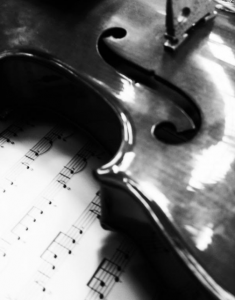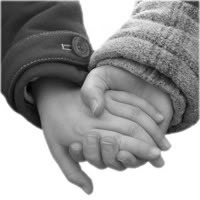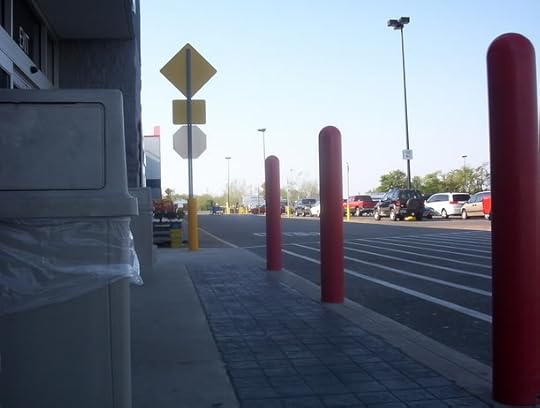Billy Coffey's Blog, page 34
January 17, 2013
Life in the digital age

image courtesy of photobucket.com
He said “Kids” and that was all, as though that one word was satisfactory enough. I supposed it was. All I had to do was turn my head to where his eyes had gone—there to the swinging doors that led into and out of the Ace Hardware. Kids, three of them. Chests puffed, music blaring. Seventeen, I guessed, no older than that. Kings of the world.
“Know what I’d like to give this younger generation?” he asked.
I didn’t and didn’t ask. I figured to him, the younger generation meant me just as much as it meant those three teens going into the Ace. There to buy some piping for a potato gun, maybe. Or some wax to shine up their rusting truck.
“Manners.” He spit a long stream of brown tobacco juice onto the lot. “Yessir, I’d give em manners.”
“Think most everybody’d do well to get a good dose of those,” I said.
He made that strange motion with his head that was part nod at the truth of what I’d said and part shake that things had gotten so bad. It was a motion that said the whole world was on a train ride to hell and we were all enjoying the scenery.
He said, “My Ella? She’s on the Facebook now. Says she’s got a hunnert friends and done liked all these movie stars and rock n’ roll singers. You ever hear such a thing?”
I recollected I did and tried not to raise my eyebrows. His granddaughter Ella was only thirteen.
“Plays them videogames, too,” he said. “You seen them?”
I said I did.
“Gets on there all jerkin’ round and whoopin. She got this one where she’s on the Olympics. Gets herself all sweaty and worn down. And you know what after? She’ll turn that game off and try some real livin, but it’s like she’s all swelled up on the inside. Like she really thinks that gold medal the computer gave her’s a real one, just like she thinks she really is friends with all them rock n’ rollers on the Facebook. It’d be funny if it weren’t so pitiful.”
He spit again, giving me an opening to say something. I couldn’t. He had a point.
“Cain’t blame em, though,” he said. “Elle or them boys what walked in there or any other. It’s the way of the world now. All’s that matter’s we feel good about ourselves. Ella, she’s comin to see she’s a queen what with all them medals on the TV screen and friends she don’t even know on the computer. Yep, gotta puff ourselves up no matter what. Reckon that’s how we get a gov’ment what doesn’t know how to balance a checkbook and a President who thinks he’s my Lord an’ savior and how a body can go kill a bunch of people and blame it on the gun in his hand and not the evil in his heart.”
He nodded, agreeing with his own wisdom, and spit again. “Yessir, manners is what I’d give em. That’s the best thing.”
I kept silent on that. Manners, you see. You respect your elders. That means not disagreeing with them in words unless it’s necessary. It didn’t seem necessary at the moment. He was mostly right, after all.
But what I think we all need in this age of false pride and self-love is fear, and a lot of it. Because no matter how advanced we become and how shiny our toys get, life still has teeth that bite. And many times the darkness we fight and the monsters that stalk us are not in the world, they are in us.

January 14, 2013
Making time for beauty

image courtesy of photobucket.com
On January 12, 2007, over a thousand commuters passed through the L’Enfant Plaza station of the Washington, D.C. subway line. A rush of people, reading their morning papers, talking on their phones. Hurrying out for another day of the grind. The vast majority of these Everymen and Everywomen never noticed the violinist playing near the doors. Panhandlers are common enough in the subways, playing their instruments for dimes and quarters that will feed them for another day.
This particular panhandler remained at his spot for forty-five minutes and collected a grand total of $32.17. Of the 1,097 people who passed by, only twenty-seven paused long enough to listen. And only one recognized the man for who he was—Joshua Bell, one of the most talented violinists in the world.
I wonder about all those people who passed through the subway station that day. I wonder if they ever saw the newspaper articles and television reports and figured out they had been there, had walked right passed him, without even knowing who he was.
I wonder of Joshua Bell, too, and what he was thinking. All of those people so near on that gray January morning, too hurried to hear the music he played. It was Bach, mostly. And the sound—the most beautiful sound a violin ever made. A sound like angels. That day, Bell used the 1713 Stradivarius he’d purchased for nearly four million dollars.
You might say you’re not surprised by any of this. You’ll say it’s the modern world we live in. People are always in a rush to get from point A to point B. There’s so much we have to keep track of, so many things to do. So much vying for our attention. It’s a generational thing. Our parents and grandparents were the ones who enjoyed a slower life. We don’t have that luxury.
Maybe so.
And yet the very same thing happened in May of 1930. Seventy-seven years before Joshua Bell played inside the D.C. subway, Jacques Gordon, himself a master, played in front of the Chicago subway. The Evening Post covered the story this way:
“A tattered beggar in an ancient frock coat, its color rusted by the years, gave a curbside concert yesterday noon on an windswept Michigan Avenue. Hundreds passed him by without a glance, and the golden notes that rose from his fiddle were swept by the breeze into unlistening ears…”
Jacques Gordon collected a grand total of $5.61 that day. Strangely enough, the violin he used on Michigan Avenue was the very Stradivarius that Joshua Bell would use in L’Enfant Plaza station all those years later.
I ask myself what I would have done had I been present there in Chicago or Washington. I wonder if those golden notes would have reached my ears and if I would have paused to listen.
I want so badly to answer yes.
I want to believe that I’m never so busy that I have no time for beauty.
I want to know that in such a dark and shadowy world, I will still make room for music and light.

January 10, 2013
Making beautiful people

image courtesy of photobucket.com
Part of my end-of-the-year routine means going through the notebooks I’ve accumulated over the past twelve months. I pour over scribbles and jottings, making sure I’ve left nothing of value behind. Often, I find I haven’t. But just now I’ve come across something I’d completely forgotten. Written diagonally across the top of a page were six words, each letter capitalized to express their importance:
CAREER DAY—I MAKE BEAUTIFUL PEOPLE
It was back last spring. Career Day at the local elementary school, and an acquaintance called to ask if I could come and talk about writing books. I told her writing books was more something I did on the side than a career. She told me when you’re dealing with a classroom of nine-year-olds, such petty distinctions don’t matter.
I went, though admittedly in a selfish kind of way. I didn’t care so much to talk about what I did nearly as much as I wanted to hear about what everyone else did. I wasn’t disappointed. That day I met firemen and police officers and truck drivers, a lady who worked on airplanes and a guy who made dentures. It was fascinating, all of it, and all of it taught me something, too—when pressed, we can all make what we do sound like the coolest thing in the world.
But it was the plastic surgeon that I remember most. Not so much for his appearance (which, fittingly enough, looked as plastic as his creations) or his demeanor (many of us consciously skipped over the tedious parts of our jobs, but I got the feeling the good doctor sincerely thought his didn’t have any). No, it was what he said that struck me then. It’s what strikes me still.
“I make beautiful people. Beautiful people don’t just happen.”
There was a short time for questions when he finished. Only one student raised a hand, a boy in the back corner who wanted to know how much it would cost for the doctor to turn him into Iron Man. The doctor laughed and did not answer. I thought it was the best question of the day.
I wanted to raise my hand and almost did. Got it as far as my shoulder before I put it back into my pocket. It was question time, not argument time. What I was thinking wasn’t a question.
Because that doctor didn’t say, “I make people beautiful.” If he had, maybe I would’ve let the whole thing go. Maybe I would’ve never made that little scribble in my notebook, and maybe I wouldn’t be writing this post. Beauty is, after all, in the eye of the beholder. But he didn’t. He said, “I make beautiful people,” and that tiny change, that minuscule switching of those last two words, made all the difference.
Making people beautiful and making beautiful people are in no way the same. One is outward; shallow. It reaches no deeper than the last layer of skin. But the other? It permeates. It covers every cell. To me, the latter is much more valuable.
And the great secret is this: It’s often the beautiful people who don’t look so beautiful at all. They have wrinkles and graying hair from worrying over their kids. They have a swollen belly from too many meals with family and friends. Their eyes are droopy and their hands are rough and calloused from work. They don’t have time to make themselves look pretty. They know the value of a person lies more in the size of their heart than the size of their breasts. It the amount of compassion that matters, not the amount of hair.
That doctor was right about one thing, though. Beautiful people don’t just happen. It takes a lifetime of walking through this world, of enduring. It’s falling down and getting up and falling down again. It’s the courage to try and love and hope when you’re surrounded by failure and hate and doubt. It means getting scars that may fade but will never go away.
Give me that beauty. Because what the good doctor promises is a pretty that will end in the grave. But that other beauty, the real beauty? It will follow us from this world to the next.

January 7, 2013
A middle finger like mine

image courtesy of photobucket.com
I figure I’m much tool old to bother with New Year’s resolutions. I’ve learned my lesson. So many of their broken bits trail along behind me now, all well-intentioned but doomed to failure. We all strive and wish and work for our own vision of wholeness, however right or wrong that vision may be, and yet we will always be broken. That brokenness, I think, is half of what it means to be human. To try and mend that brokenness nonetheless—to stare ahead into some yet unformed tomorrow and see ourselves becoming the people we are meant to be—that is the other half.
At ten and on the cusp of eleven, my daughter suffers no such constraints of worldly wisdom. She not only embraces the concept of resolutions, she devoted much of her Christmas vacation to them. She filled pages upon pages of the small black notebook she carries with wondrous ideas of self-improvement. I cautioned her to narrow things down a bit, cut five pages down to one and then whittle things even further, to a single focus. After much deliberation and crossing out, she announced to me on New Year’s Day her goal for the coming year:
To have a middle finger like mine.
My first thought—God forgive me—was that she meant something along the lines of the lewd gesture to which we are all familiar. Not so. She took my hand and stretched it out, showing me the hump of hard skin just inside the first knuckle of the middle finger on my right hand. She pressed it, then smiled and said, “Feels like a marble. I want one.”
“Doesn’t look too good,” I told her. “Which doesn’t really matter with me, since I’m a guy. Guys tend to think the rougher their hands are, the better. Means they’re doing stuff.”
“I want one,” she said again. “I want to do stuff. Think that’s fine?”
“I think that’s very fine.”
She sat down beside me. A worn nub of a pencil appeared from one of her pockets. That black notebook of hers came out of the other. She opened to a page near the middle and took the pencil in her hand, placing her forefinger along the barrel and wrapping her middle finger around it just so.
I asked, “What are you scribbling?”
“I don’t know. Just words. Sometimes I don’t know what’s gonna come out until it does. Is that bad?”
“Nope,” I said. “I think that’s the best.”
She wrote for twenty minutes maybe, working on those words she didn’t know, working on that writer’s bump she wants on her middle finger. I told her it would take time. Lots of time and lots of scribbling. My daughter doesn’t care.
She says she has stories to tell and everyone does, and if we keep those stories locked up inside us they’ll die and maybe an important part of our hearts will die right along with them. She’s a smart one, my daughter, and wise.
I only told her some of what that hard hump of skin on my finger means. Time and practice, yes, but there is also more and harder. Because if she really wants to tell her stories, my daughter will find the going rough. There is no journey in this life fraught with more peril than the journey inside ourselves, no land more arduous and unexplored, and we cannot ever hope to venture there and return unscathed. Every writer bears ugly scars, just as every person does. The hump on my finger is merely the one most visible.

January 2, 2013
Did you have a good Christmas?

image courtesy of photobucket.com
“Did you have a good Christmas?” is what you’ll hear a lot of now. It will be the conversation starter co-workers and friends will use, a prelude to what they believe are more important things. And invariably your answer will be “I did,” and you will obey social convention by posing that same question back.
I’m going to offer you that same question now. Did you have a good Christmas? I ask you because I’ve asked myself and others, and the responses I’ve gotten depend a great deal upon a very tricky thing—
What makes a good Christmas?
I’ve found it depends. There are as many answers to that question as there are people. We are a world of individuals, and though we often seem of one accord when it comes to what makes us sad, what makes us happy can differ greatly from person to person. Isn’t that strange? There’s some sort of grand wisdom in that notion, but I can’t seem to dig deep enough to find it.
For me, a good Christmas revolves around family. Having family close always ensures the holidays will be peaceful and bright. I shared this thought with someone at church last Sunday. He nodded and said this Christmas he’s kept his family close as well. All fifteen of them. Parents and brothers and in-laws and children, all packed into his tiny ranch home. “Silent night?” he asked. “Joy to the world? Not so much.”
Despite what my kids will tell you (“Christmas is all about the baby Jesus” is always their first response, automatic in the same way they’ll say Bless you after you sneeze, and often with just as much feeling), deep down they still feel Christmas is about the stuff. It’s those shiny packages under the tree, all that paper and possibility. It was a banner year for them. Also for one of their friends from school, who didn’t get much from Santa but who on Christmas morning found elf footprints in his living room that looked much like baby powder and reindeer droppings on his sidewalk that smelled much like raisins. His father had been laid off from the factory and his mother was fighting a nasty case of the flu, but that didn’t stop both of my kids from saying their friend had a great Christmas, maybe even greater than their own. I agreed. After all, my kids just got stuff. Their friend got magic.
Health is what many of us would say makes a good Christmas. Any Christmas is good so long as everyone’s healthy. And that’s true. A neighbor of mine lost her daughter from a long illness late Christmas day. I was sure she would say she’d trade all the family and stuff and magic in the world for her little girl’s health. But she didn’t. She said her daughter got to help decorate the tree this year, got to watch the star on top lit and flashing. She said the holiday is a reminder that God so loved the world and so hated death that He’d do anything to spare us all from it, even if it meant sacrificing His only son.
In many ways, this is my neighbor’s worst Christmas ever. In one large and magnificent way, it is her best.
Did you really have a good Christmas?
By all accounts I can call my own a rousing success, but I want to know why exactly. I want to put my finger on it, touch it. Know it.
Because I don’t think it’s the family at all. Certainly not the stuff. Not even the magic.
No, I think it’s something along the lines of what my neighbor said.
God so loved the world.
So loved us.
So loves you and me.
I think it’s that promise that makes every Christmas a good Christmas, no matter how much heartache may come with it. I think it’s that gift. One not given to us on one day of the year but all of them, wrapped tight. All we have to do, I think, is open it.

December 31, 2012
Goodbye to the old

Sunrise over the Blue Ridge Mountains courtesy of photobucket.com
The first time I saw the sun rise upon a new year was 1990. I was seventeen then. It was at a party thrown by a pretty girl at school. Her father was a doctor before the cancer took him. They lived in the oldest home in town, a bricked farmhouse settled in the middle of cornfields that had gone from verdant to brown as the cold months settled in. I didn’t want to go to that party. She was rich and her rich friends would be there. But she’d invited me and I’d said yes. When you’re seventeen, the last way you want to watch the ball drop is on the sofa with your parents.
The whole thing went as expected. Lots of food I could not pronounce, let alone knew how to eat. Lots of noise that went into my ears and bored into a deep place in my head, throbbing my temples. When midnight came and Dick Clark began his countdown, there were cheers from those who’d come alone and wet, sloppy kisses from those who’d brought dates. That was my first New Year’s party. Also my last.
It was to be an all night affair of movies and music and raging hormones. I hung in there as long as I could, around six that next morning. I snuck away and took a walk in those lonely fields. There is a silence in the world’s open places that deepens come winter, one so thick you don’t walk through it as much as push it aside. Such was the quiet I found in the midst of those cold and broken stalks left by the autumn harvest. It was peace and stillness around me and the faint yellows and oranges of morning bearing up over the Blue Ridge ahead and a long swath of the Milky Way winking out above. And though I was too young to understand why, I knew then that this was the way to say goodbye to the old and hello to the new.
I have celebrated New Year’s that same way since, all twenty-two of them. I will celebrate tonight’s that same way as well. Because to me, a beginning is best made at sunrise than in the midst of night. You can watch yourself take that first step. You can make sure you land in a solid place.
I will stand in my front yard instead of a field this year, and I will be the man I am rather than the boy I was. But there will still be the deep silence and the stars overhead and morning about to pour down from the mountaintops. I will stand there and know we have made it through yet another year. We have survived. Bruised, yes. But here. And I will know that all those cares that burden me and all those worries that engulf me are held in God’s open palm, and I will be glad.

December 24, 2012
Joseph’s Christmas
Hey folks.
Name’s Joseph. Joseph who, you ask? Joseph of Nazareth. Jesus’s Pop. The other father. No, no. That’s okay. No offense taken. I’m used to kind of being the guy in the corner, the mystery man. I don’t mind, though. Promise.
I just wanted to tell everybody Merry Christmas, and thought this would be the best way to do it. Computers. Who could have dreamed that one up back in my day? It would have seemed impossible. But I’ve seen plenty of the impossible. Nothing much surprised me after that night.
Everybody considers Santa to be the father of Christmas, but I guess I could share that title. Which is funny, because I tend to be left out of things. The focus is on Jesus, as it should be, and then Mary. Angels. Shepherds. Wise men. There’s a lot going on in the Christmas story. But me, I’m just the guy standing beside the manger in the Nativity scene. Not a lot of people understand my side of the story. Which is another reason why I’m here.
Christmas is a lot of things to a lot of people. For many, it’s the greatest time of the year. It’s a time for joy and togetherness, for peace and love. For some, though, Christmas isn’t what it should be. It can be lonely and depressing and scary. I knew both sides of Christmas on that night. I knew both the magic and the hardship.
You have to remember, Mary and I were far from home. Bethlehem is about seventy miles from Nazareth. The going wasn’t easy, especially for her. There she was, nine months pregnant and having to ride a donkey all that way. We slept on the hard ground and had to deal with the weather. It was tough. And to make matters worse, we were travelling that far just to get taxed.
Then, once we got there, we find that there’s so many people that all the rooms are full. So it’s out to the stables for us. Let me tell you, that wasn’t easy for me to bear. I’m supposed to provide for my family, right? But instead of me being able to get Mary a room, my pregnant wife has to sleep with the cows and the horses.
No, that first Christmas wasn’t easy at all. Not for me. I was just a carpenter, remember? And to hear some folks, I wasn’t even a very good one. I was just a man, just like any other. Yet an angel told me that the woman I loved was carrying God in her belly, our whole town was saying some Roman soldier was really the one who got her pregnant, and we were both weeks from home, tired and hungry and scared, having to spend the night in a barn. Doesn’t sound like the scene on the front of your Christmas cards, does it?
So yes, I know this time of year can be tough. I know it can magnify the loneliness and fear that a person feels. But trust me on this: hidden behind all that loneliness and fear is the very same miracle that I saw that night. The real Christmas magic. Because when I held the Child, that fear and loneliness left me. Everything Mary and I had to endure seemed meaningless and small. The only thing that mattered was Him.
That’s what I want to tell you. Whether these days find you well or sick, hopeful or fearful, whole or torn, He is what matters. Look at the Babe in the manger, and you will see everything differently from then on.
Merry Christmas to you all.
Love,
Joseph

December 17, 2012
Hold each other’s hands and close your eyes

image courtesy of photobucket.com
“Hold each other’s hands and close your eyes.”
That’s what the police said just before leading the survivors of Sandy Hook Elementary from the school to safe ground. Of all the horrible things I’ve read about Friday, all the stories of grief and anger, that’s what remains most in my mind.
Three days later and it’s still in every place and upon every mouth and inside every heart. Those poor kids and teachers and administrators, gone. The hole they leave behind is one we all feel. It’s palpable, almost. It’s a coppery taste in the back of our mouths and a cold wind that follows us no matter where we go, hunkering us over.
Like you, I’ve been doing a lot of thinking since Friday.
I thought of the children lost and I thought also of the children who weren’t. Millions of them all over this country, whose Friday was spent not unlike any other. And I thought of those children who received that night a love they’d always deserved yet haven’t been given for a very long while, all because of what happened in Newtown.
I thought of all the ones who had never prayed or had given up praying lowering their heads and speaking to God.
I thought the grownups—of this country as a whole—and how even this unspeakable act could not unite us. As soon as the news broke and the word spread, we turned our grief into shouts of more guns and less guns.
But most of all, I thought of Christmas. I thought of how Christmas was magic to all those poor children and about all those gifts already bought and hidden away in attics and closets, and how those parents will have to pull them out knowing they’ll never be given.
We are left now with the same questions times such as these always offer. Why? always comes first. How can we move on? always comes after. We’ve all heard reasons why these things happen. It’s the guns or it’s secularism or it’s the lack of care for the mentally unstable. It’s because God wills it or because we subscribe such power to any god other than ourselves. I have no answer to why, and maybe that’s for the best. Maybe if we knew why—if we understood the people who did such things—we would be less human than we are.
But the question of how we can move on? That answer may come easier. Not by any insights I have, but the insights of those police officers last Friday afternoon.
Hold each other’s hands and close your eyes.
That’s our answer. Given to groups of innocent children that they may survive those harrowing moments. Given to us that we may survive the harrowing aftermath. In that simple statement lies all we have in this life and all the comfort we need—the gift of the moment, and the promise of eternity.
Because what more can we do now and always than hold each other’s hands and understand that the only breath we’re ever guaranteed is the one we’ve just taken? That all we have—our very lives—lie neither in yesterday or tomorrow, but in the small space of this one moment? Shouldn’t that moment then be spent with a sense of passionate urgency?
We should be ravenous with life. We should devour our moments. And we should never, ever let that moment pass without drowning it in love.
And we should close our eyes. Not to the darkness of this world or the dangers that lurk in it, but so our hearts can ponder the One who transcends both. People wonder why Christians are so adamant to keep faith as the center of Christmas, why we fight for our Nativities and bemoan the generalization of the holiday. Newtown is why, precisely that—because we know that by Christmas this dark and dangerous world has been overcome. That we have this moment and eternity both, and by each of them we need not live in fear and despair.
I cannot tell you why those children died, but I can tell you why Christmas came. And if I could only know the answer to one of those questions, it would be the latter. Perhaps we’ll all know the answer to the former one day, perhaps not.
But until then, let’s take this moment to hold tight to each other, and let’s close our eyes.

December 13, 2012
Ringin’ for Jay-zus

image courtesy of bing.com images
An acquaintance of mine has spent a few days this week standing outside a local Wal-Mart. Busy place this time of year, but you’d still see him. He’s the one guarding a red kettle and holding a bell in his hand.
You’d hear him before you saw him, most likely. CLANGEDY-CLANGEDY-CLANGEDY. The sound of Christmas. He signed up for three four-hour shifts, which he says is about as much as his old body can take.
“Ringin’ for Jay-zus,” he says.
He tells me it’s mostly a nice way to spend an afternoon. I’d agree with that. I’ve always wanted to be a bell ringer for The Salvation Army, and one of these days I will. Me and the kids, I think. It’d be a good life lesson for all of us. It certainly has been for my friend. He’s learned a lot about people this week, and about himself most of all.
I asked him what it’s like to stand out there. I’m not an innocent when it comes to these modern times. Things happen to bell ringers that didn’t used to. They get robbed or accosted or made fun of. I would imagine such things could never happen around here, but you never know. Doesn’t matter where they are, people are still people. Here’s what he told me:
He likes standing in front of the Wal-Mart better than standing in front of the higher-end stores. Sure, the perks aren’t as good (last year he got free hot chocolate from the coffee shop downtown), but he said the giving is different. Wal-Mart folks tend to give both more and more often than other folks. That surprised me, but not him. He said poor folk know what poor feels like, and that’s something they’d never wish on anyone else.
And he knows all about how some people skirt as far away from the kettle as they can. How they’ll look down at the ground real quick as they pass or pull out their phones. Every bell ringer knows this, he said. These are the people who don’t have any change in their pockets or who gave last week or who are just in a hurry to get some shopping done. He doesn’t begrudge anyone for this. He gives such people the same CLANGEDY-CLANGEDY-CLANGEDY and “Merry Christmas!” as he gives those who pull out their ones and fives. He wanted me to make sure I passed that along—it’s okay if you don’t give money. Sometimes a smile is good enough.
But mostly ringin’ for Jay-zus isn’t about the poor or even Christmas, it’s about him. He said that bothered him a good deal at the start, but not so much now. He figures it’s God’s way of teaching him something that maybe otherwise would have gone unnoticed.
My friend’s honest—sometimes those four hours fly, and sometimes they don’t. Sometimes that bell feels light as a feather, and other times it’s an anvil. It can depend on everything from how much sleep he’d gotten the night before to what the weather is, but he doesn’t think that’s the point. No, the point is how he feels sometimes when he’s smiling and Merry Christmasing and going CLANGEDY-CLANGEDY-CLANGEDY.
Because sometimes he feels like he’s really doing something. That he’s a part of something bigger than himself and contributing some good. That the world maybe isn’t in as bad a shape as everyone says it is.
Other times, he’s a little more skeptical. No one puts anything in that old kettle. Three hours standing here in the cold with my knees locked up, he thinks, and for what? A few handfuls of silver. They walk in acting like they can’t give me anything, they walk out with flat screen TVs and pack them in fancy SUVs with Jesus is the Reason for the Season bumper stickers. He thinks such a thing makes Jesus nauseous. Then he wonders what kind of television reception they get in hell.
Not that he’s exempt himself. Because there are plenty of times when he stands there ringing his bell thinking about how much God must love him right now, because he could be sitting at home or out watching a movie but instead he’s standing in front of the Wal-Mart freezing to death for the poor people. Those are the times he thinks hell is earmarked for people who don’t think they deserve to go there.
It’s mostly the realist in him that wins out in the end, though. The part of my friend that says we’re all trying as much as possible to do what we can. That we’re all lost and wanting, and we’re all just trying to find our way. That deep down, all we really want is to love and be loved.
That’s what ringing the bell has taught him most.

December 10, 2012
Old Saint Fred

image courtesy of photobucket.com
I’ve always had trouble with the parking lot at Wal-Mart. Don’t ask me why. Maybe because it’s so big or my mind is usually on what I need and what aisle I can find it. Not sure. But regardless, a trip there usually concludes with me wandering around looking for my vehicle, thinking that this must be what old feels like.
Take the weekend, for instance. Nice Saturday afternoon. Sunny. Cold but not frigid. Christmastime. And me, wandering around the west end of the parking lot feeling like one of the misfit toys.
As it is the weekend and it’s only another couple weeks until Christmas, the parking lot is full of cars. Squeezing between cars and trucks, I happen upon a green mini-van. The driver is nestled snug in his seat, seatbelt on, and dead to the world.
Lucky guy, I think. Lets his wife go into the throng of crazed discount shoppers. Lets her fight and claw and scream for the last Elmo or Barbie, and then lets her stand in line alone for half an hour while since only three of the forty checkout lines are open. And he gets to snooze in the mini-van.
Then something about him catches my eye. Not something in particular, but overall: longish white hair and beard, red shirt and pants, and a jelly-like pudge in the midsection.
This was no mere guy.
This was Santa.
One of his eyes opens and stares at me staring at him. We’re locked that way for a moment, each trying to figure out what’s going on and what’s happened. I smile. He smiles.
“Hiya,” he says, rolling down the window.
I nod. “Guess if anyone’s tired this time of year, it’d be you.”
He lets out a long exhale, shakes his head, and says, “Buddy, you don’t know.”
Santa, as it turns out, isn’t Santa at all. Fred’s his real name. Just finished his shift at a local store and was on his way home when Mrs. Fred called. Could he stop by Wal-Mart and pick up a few things?
He’d made it, but barely. Having kids sit on your lap for four hours tends to tucker a person out, Fred said. As soon as he put the car in park he felt that warm sunshine streaming through the window. Next thing he knew, he was awake and staring at me.
“Been a rough year,” he told me. “I’m used to kids wanting things, you know? ‘I’d like a truck’ or ‘I’d like a dolly’ or ‘Could you bring me a dinosaur?’”
“What’s the big gift this year?” I asked him.
“Hope,” he said. “Kids want hope.”
Those words stunned me. I swallowed nothing and furrowed my brow.
“What you you mean?” I asked him.
“Shoot, son,” he said. “Take a look around. It’s bad out here. Money’s dryin’ up, parents losin’ their jobs. I had a kid sit on my lap this morning and ask me to find his daddy a job. Had another who just wanted her mommy to stop crying all the time. And one, one said his daddy told him Santa might not come this year, but he knew that since he’d been a good boy, Santa’d have to come and leave him something. And that’s just today. Just today, you see? Hey, don’t get me wrong. I love Christmas. But between you and me, I’ll be glad when this one’s over.”
“Guess so,” I said. “I’ll leave you to your napping, then.”
“Thanks,” Fred answered. “And Merry Christmas.”
“Merry Christmas.”
I found my truck right where I left it and decided to drive by Fred on my way out of the lot. He was asleep again.
My ride home wasn’t filled with Jimmy Buffett’s Christmas Island or Harry Connick Jr.’s When My Heart Finds Christmas. There was instead only silent contemplation.
Hope. That’s what Fred said the kids want this year. I would imagine that’s what a lot of grownups want this year, too.
Sad, isn’t it, that for many people this time of year isn’t a time for hope? For presents, certainly. And for family. But not hope. Christmas was turned into X-mas, which has now been turned into Holiday (that story comes tomorrow). All of this was conceived to keep everyone happy. To include everyone and give no reason for offense. But by doing so, I fear we’ve buried the very hope so many people seek this year.
The hope that was born on Christmas day a couple thousand years ago in a tiny manger in a tiny town. Hope wrapped in a baby.





